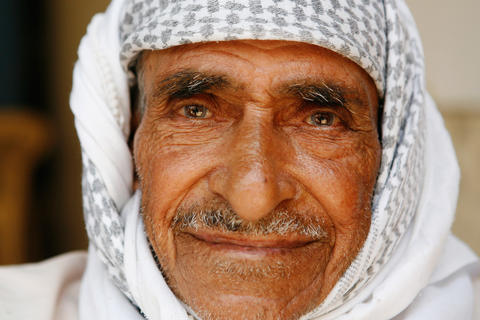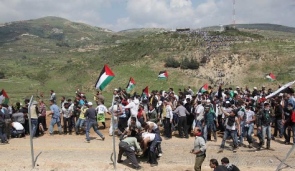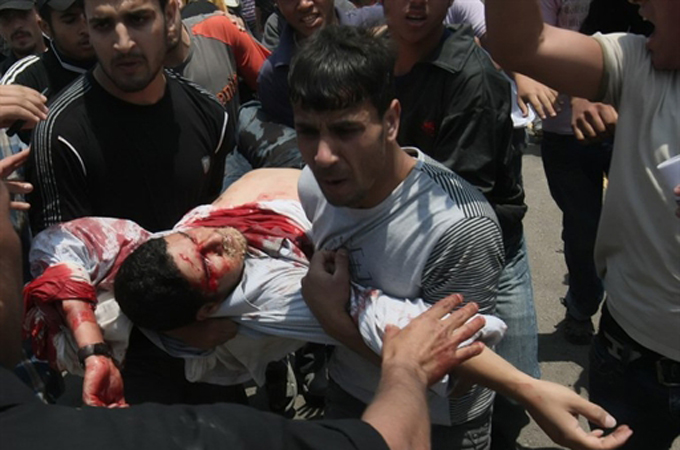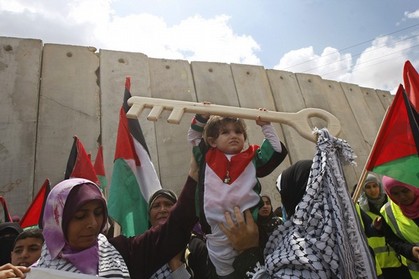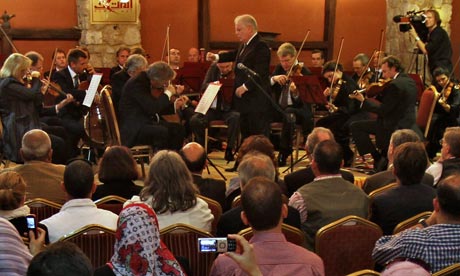EDITOR: Obama rides again, full speed to Nowhere!
Again, like after the Ciro declaration in 2009, Obama the speechmaker is speaking, while Obama the President is silent. All those words mean less than nothing, of course. The record is clear – the one person who has recived a Bobel Prize for Peace before he did anything, proves to also be one who will never earn the prize…
His talk about Israel is empty repetition – he is NOT about to do anything to make Israel do anything – and he is the only person in the position to so do! It is clear that Obama has achieved the impossible: He has done less than George (Dubya) Bush towards just peace in the Middle East!
Many of the pieces below deal with this show of oratory.
Obama to Israel: Take whatever you want: Al Jazeera English
In his latest speech, Obama’s thinly veiled rhetoric proves he will do anything to satisfy his pro-Israel voter base.
Lamis Andoni Last Modified: 23 May 2011 16:02
”] In 2008, Barack Obama, the Democratic presidential candidate, pandered to pro-Israeli voters and Israel by promising in a speech addressed to the American Israel Public Affairs Committee (AIPAC), that Jerusalem would forever remain “the undivided capital of Israel”.
In 2008, Barack Obama, the Democratic presidential candidate, pandered to pro-Israeli voters and Israel by promising in a speech addressed to the American Israel Public Affairs Committee (AIPAC), that Jerusalem would forever remain “the undivided capital of Israel”.
Three years later, Obama is on another pre-campaign trail in order to improve his chances for re-election in 2012. As part of this campaign, he has made a new round of half-hearted attempts to revive the stalled “peace process” completely under Israel’s terms.
In his latest speech addressed to AIPAC, Obama promised Israel everything short of allegiance by reaffirming America’s commitment to Israel’s political and security goals. His speech denied the right of Palestinians to declare a nation and he even vowed to block any peaceful Palestinian efforts to claim their legal rights at international organisations.
Obama’s lip service to Palestinian “self-determination” is nothing more than vacuous rhetoric – as he clearly implied that Israeli interests, especially its security, remain the top priority for American foreign policy in the region.
He mechanically repeated his commitment to the vision of a two-state solution – establishing a Palestinian state alongside Israel. However, as expected, he left the borders and terms of the creation of such state subject to Israel’s “security interests”.
His reference to resuming peace negotiations on the basis of the 1967 borders (also known as the Green Line) means neither a complete Israeli withdrawal from the occupied territories nor the establishment of a sovereign Palestinian state on all of the land within the Green Line, including East Jerusalem.
There is a significant difference in negotiations “lingo” and even legal language between saying that the establishment of a Palestinian state “will be based on” 1967 borders as opposed to saying it “will be established on” the 1967 borders.
The first leaves ample room for Israel to continue occupying and even annexing vast settlement blocs (and perhaps even all of the illegal, Israeli settlements in the West Bank and East Jerusalem) for “security reasons”.
Take whatever you can
Just in case his pro-Israel support base misunderstood the thinly veiled statements from his Middle East speech last Friday, Obama made sure to clarify to his definitively pro-Israeli view that there is no going back to the true 1967 borders:
“[The statement] means that the parties themselves – Israelis and Palestinians – will negotiate a border that is different than the one that existed on June 4, 196… It allows the parties themselves to account for the changes that have taken place over the last forty-four years, including the new demographic reality.”
In clearer words, the president is effectively, although not explicitly, equating the presence of Palestinians on their own land with the illegal presence of Israeli settlers living on land confiscated forty-four years ago from the Palestinians.
Basically, despite the fact that settlers live on that land illegally under international law, because they are physically there, the land becomes theirs.
This confirms the belief of many in the region that the construction of Israeli settlements and of the Separation Wall inside the 1967 borders is Israel’s way of slowly completing a de facto annexation of Palestinian land.
This latest of Obama’s statements may be the closest the president has come to legitimising illegal Israeli settlements.
Obama’s message to Israel appeared to confirm that he is ready to keep former president George Bush’s 2005 promise that Israel would be able to keep their largest settlements blocs as a result of any negotiated solution for the conflict.
In other words, Obama’s idea of Palestinian self-determination is for Palestinians to accept whatever Israel decides.
In his AIPAC speech, and the previous speech addressed to the Middle East, Obama seemed to have either been out of touch with, or to have simply ignored, the changes brought about by the Arab Spring. For while he argued that Israel should understand that the Arab Spring has altered the political balance in the region, and that Israel should understand it now has to make peace not with corruptible Arab leaders, but with the Arab people themselves.
So much for hope and change
In fact, when it comes to the Palestinian cause, Obama is speaking and acting as if the Arab Spring has not taken place. He has to remember that even America’s most loyal Arab allies in the region could not openly support the American-Israeli formula for peace with the Palestinians. So, why then would it be acceptable to millions of pro-Palestinian Arabs?
The Arab Spring may have affected the semantics of American discourse on Palestinian rights but it has not created anything close to a real shift in American policies.
Once again, Obama has succumbed to political blackmail by Netanyahu – whose main goal of raising objections to the peace process is to make sure that Israel continues undisturbed with its expansionist polices, and not because of any real fear from the president’s weak demands.
Yes, there is no doubt that Netanyahu wants to see any reference to 1967 borders dropped from the discourse, because Israel is currently busy drawing its own militarily imposed future borders, he could not have misunderstood Obama’s clearly pro-Israeli statements.
As the American president pointed out in his speech, he has made good on his declaration of “full commitment” to Israeli interests and security needs: “That’s why we’ve increased cooperation between our militaries to unprecedented levels. It’s why we’re making our most advanced technologies available to our Israeli allies.”
“And it’s why, despite tough fiscal times, we’ve increased foreign military financing to record levels.”
Obama has not only been consistent in maintaining full US support for Israel but has also articulated a new, more decisive stance which explicitly confirms the long-standing American policy of blocking any peaceful Palestinian efforts through international law and the United Nations.
“…The United States will stand up against efforts to single Israel out at the UN or in any international forum. Because Israel’s legitimacy is not a matter for debate”, he promised the gathering of the staunchest and most influential supporters of Israel.
By siding with Israel against the Palestinian Authority’s plan to seek United Nations recognition of a Palestinian state on the 1967 borders, the US has in effect declared war on all Palestinians, the Palestinian Authority and activists alike.
He will unabashedly thwart any efforts to pursue legal and peaceful means of challenging the continued Israeli colonisation of their land.
But by labeling such campaigns aimed at recognition of a Palestinian state as an attempt “to delegitimise” Israel, the president is inadvertently recognising that those Israeli policies themselves lack legitimacy.
A rights based discourse?
Furthermore, while Obama’s assertion that UN recognition alone cannot create a Palestinian state is technically true, it will restore the topic within a legal rights discourse – which would not be defined by Israel’s security concerns as it has in the past.
Such UN recognition, of course, would work towards the establishment a Palestinian state defined by the 1967 borders – meaning that all Israeli settlements within that border would have to be evacuated. Without this, it would only legitimise and perpetuate the American-Israeli negotiations formula.
But Obama has not taken any risks in order to promote peace.
He fears foiling decades of American policies that have aimed to veto any UN resolution pertaining to Israeli crimes and, starting a new discourse about the conflict that would be rights-based.
It was no surprise either when Obama declared the reconciliation agreement between Fateh and Hamas, signed earlier this month, to be an “obstacle” to peace in the region. After all, in his purely pro-Israeli mindset, any attempt at Palestinian unity – regardless of how feeble – does not serve Israeli interest and its tried and true “divide and conquer” method has prevented any real progress for years.
Obama’s repeated refrain about Hamas being an unacceptable peace partner, sounds not only like a broken record, but also like a lame excuse for Israeli extremism and intransigence.
If he wants to know who the true unacceptable partners for peace are, all he has to do is get an English transcript of discussions from the Israeli Knesset (parliament) and read how members from the political right call Arabs “animals” and make all manner of racist slurs against Palestinians.
But if Obama is willing to encourage Israeli policies such as ‘land transfers’, which aim to displace whole Palestinian communities and refers to them as mere “demographic changes”, then why would he care about racist rhetoric and threats by right-wing Israelis?
In his latest speeches, Obama did not refer once to the events that took place on the May 15 ‘Nakba Day’ protests. During these peaceful demonstrations, the Israeli military responded in a predictable way, in the only way they know – by firing indiscriminately on unarmed protesters. By the end of the shooting spree, more than 20 people were killed at the Syrian and Lebanese borders.
Perhaps the most disturbing part of Obama’s speech is his exaggerated attempt to adopt the Israeli narrative and by default, his complete denial of Palestinian national rights.
In the end of his speech, Obama’s claim that Israel’s history could be characterised by a struggle for freedom (a repeat from his 2008 AIPAC speech) says it all:
The American president refuses to see Israeli oppression and repression. He refuses to recognise the legitimacy of the Palestinian struggle for freedom – because if he did, he just might hurt his chances at winning a second term as US president.
Lamis Andoni is an analyst and commentator on Middle Eastern and Palestinian affairs.
The views expressed in this article are the author’s own and do not necessarily reflect Al Jazeera’s editorial policy.
Hamas: Obama will not force Israel recognition: Ma’an News
Published Sunday 22/05/2011 (updated) 23/05/2011
GAZA CITY (Ma’an) — Hamas spokesman Sami Abu Zuhri on Sunday slammed Barack Obama’s speech to the American-Israel Public Affairs Committee, saying the US president’s call on the party to recognize Israel would go unanswered.
In Washington, Obama addressed the powerful pro-Israel lobby group and elaborated on statements made Thursday in his Mideast policy speech, urging calls to democracy and reform across the region.
He re-stated his position that the 1967 armistice lines should be the basis of negotiations between Israel and Palestine, saying Israeli Prime Minister Benjamin Netanyahu rejection of the call Friday was due to a misunderstanding.
Obama called on Hamas to recognize Israel and renounce violence and also reaffirmed his support for Israel and Washington’s commitment to go “beyond” regular military assistance to Tel Aviv in order to help “maintain Israel’s qualitative military edge.”
The Hamas spokesman said the speech showed the US administration was “not a friend to the people of the region.”
Abu Zuhri said Obama’s continued support of Israel showed the US was biased, and would “support the occupation at the expense of the freedom of the Palestinian people.”
The spokesman called Obama’s statements on the inevitability of the failure of a Palestinian move seeking statehood at the UN an effective denial of the right for Palestinians to have an independent and sovereign state.
Abu Zuhri also spoke out on the widely accepted stance of starting negotiations based on a Palestinian state on the pre-1967 borders, saying it revealed the mistake that was the “gamble on the American role” in negotiations.
While Hamas has said it would recognize Israel once it withdraws to the 1967 borders, the party holds that negotiations should be based on the borders of historic Palestine, resulting in far fewer concessions for Palestinians who would start out with a much stronger bargaining position.
“The US administration will fail, just as all others have in the past, in forcing Hamas to recognize the occupation,” Abi Zuhri said of the request to recognize Israel ahead of talks.
Netanyahu to Congress: Ready to make painful compromises, but Jerusalem will not be divided: Haaretz
The prime minister was welcomed to the U.S. Congress by a long standing ovation, after which he praised the U.S. for their strong ties and shared values with Israel.
Prime Minister Benjamin Netanyahu opened his speech at the United States Congress on Tuesday by reiterating Israel’s strong ties with the U.S., saying “Israel has no better friend than the U.S. and the U.S. has no better friend than Israel.”
The prime minister’s speech was briefly disrupted by a heckler, who was quickly escorted out by security. Netanyahu said about the heckler, “I appreciate that protesting is aloud” adding “this is the real democracy.”
Netanyahu rejected those that call Israel a “foreign occupier”, saying that no one could deny the “4,000 year old bond between the Jewish people and the Jewish land.”
“Why has peace eluded us?” the prime minister posed as he began to discuss the conflict between Israel and the Palestinians. “Because so far, the Palestinians have been unwilling to accept a Palestinian state if it meant accepting a Jewish state alongside it.”
Reiterating a point he has made several times throughout his official trip to Washington, Netanyahu said that Israel “will not return to the indefensible borders of 1967.”
“Israel will be generous on the size of a Palestinian state, but will be very firm on where we put the border with it,” Netanyahu said.
At the start of his speech, the prime minister congratulated the U.S. on getting Osama Bid Laden, adding “good riddance”.
“I am dearly moved by this warm welcome,” Netanyahu said, after being received in Congress by a long standing ovation. He received another standing ovation after mentioning that he saw many friends in the audience “both Democrats and Republicans.”
As part of his visit to Washington the prime minister had earlier met with U.S. President Barak Obama, after which he reiterated his stance that Israel cannot go back to the “indefensible” borders of 1967.
The two leaders’ meeting came a day after the U.S. president’s Mideast policy speech called for negotiations for a two-state solution based on 1967 lines.
On Monday, Netanyahu spoke at the AIPAC policy conference where he spoke about Obama’s “ironclad commitment” to Israel’s security.
He also reiterated his rejection of Obama’s call for an Israeli-Palestinian peace based on 1967 lines.
Israel has historically enjoyed broad support from the U.S. Congress, a sign of which was seen at the AIPAC dinner when Senate Majority Leader Harry Reid challenged Obama’s on the border issue, saying “No one should set premature parameters about borders, about building or about anything else.”
U.S. sponsored peace talks between Israel and the Palestinians have been at a standstill since an Israeli freeze on West Bank settlement building expired in September. Palestinians insist that a building freeze be reinstated before they return to the negotiating table, while Israel has said that they must return to negotiations with no preconditions.
Palestinians have said that they will meet in Ramallah on Wednesday to determine what their next step will be, following Netanyahu’s visit to Washington.
